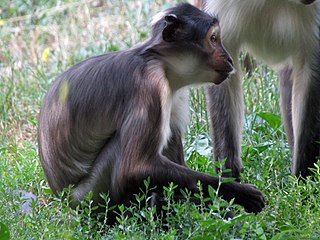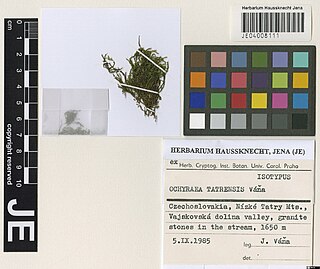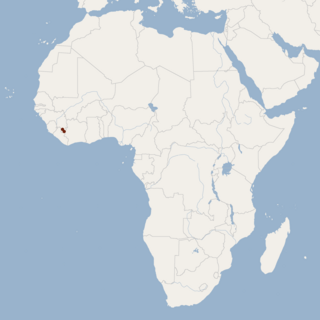
The International Union for Conservation of Nature (IUCN) Red List of Threatened Species, also known as the IUCN Red List or Red Data Book, founded in 1964, is an inventory of the global conservation status and extinction risk of biological species. A series of Regional Red Lists, which assess the risk of extinction to species within a political management unit, are also produced by countries and organizations.

The guenons are Old World monkeys of the genus Cercopithecus. Not all members of this genus have the word "guenon" in their common names; also, because of changes in scientific classification, some monkeys in other genera may have common names that include the word "guenon". Nonetheless, the use of the term guenon for monkeys of this genus is widely accepted.

The white-eyelid mangabeys are African Old World monkeys belonging to the genus Cercocebus. They are characterized by their bare upper eyelids, which are lighter than their facial skin colouring, and the uniformly coloured hairs of the fur. The other two genera of mangabeys, Lophocebus and Rungwecebus, were once thought to be very closely related to Cercocebus, so much so that all the species were placed in one genus, but Lophocebus and Rungwecebus species are now understood to be more closely related to the baboons in genus Papio, while the Cercocebus species are more closely related to the mandrill.

Python is a genus of constricting snakes in the Pythonidae family native to the tropics and subtropics of the Eastern Hemisphere.

A genet is a member of the genus Genetta, which consists of 17 species of small African carnivorans. The common genet is the only genet present in Europe and occurs in the Iberian Peninsula, Italy and France.

A conservation-dependent species is a species which has been categorized as "Conservation Dependent" ("LR/cd") by the International Union for Conservation of Nature (IUCN), as dependent on conservation efforts to prevent it from becoming endangered. A species that is reliant on the conservation attempts of humans is considered conservation dependent. Such species must be the focus of a continuing species-specific and/or habitat-specific conservation program, the cessation of which would result in the species qualifying for one of the threatened categories within a period of five years. The determination of status is constantly monitored and can change.
Windbalea viride is a species of insect in the family Tettigoniidae. It is endemic to Australia.

Platyhypnum tatrense is a species of moss in the family Amblystegiaceae endemic to Slovakia. Its natural habitat is rivers. It is threatened by habitat loss.

The stoplight parrotfish is a species of marine ray-finned fish, a parrotfish from the family Scaridae, inhabiting coral reefs in Florida, Caribbean Sea, Gulf of Mexico, Bermuda and as far south as Brazil. It mainly feeds on algae by scraping and excavating it with its teeth. Like most of its relatives, it is able to change sex.

Geoglossum is a genus of fungi in the family Geoglossaceae. They are commonly called earth tongues. The type species is Geoglossum glabrum. Geoglossum species are distinguished from the related genus Trichoglossum by the lack of setae on the spore bearing surface. Geoglossum species are characterized by dark, club-shaped, terrestrial ascocarps with a fertile hymenium continuing downward from the apex of the ascocarp along the stipe, eventually intergrading with a sterile stipe. The ascospores of Geoglossum range from translucent to dark brown, and are fusiform, and multiseptate. Identification of species is based on the gross morphology of the ascocarp, color and septation of the ascospores, and shape and ornamentation of the paraphyses.

Microglossum viride is a species of fungus in the family Leotiaceae. They are commonly called green earth tongues.

Microglossum atropurpureum is a species of fungus in the family Leotiaceae. In the UK, it has been given the recommended English name of dark-purple earthtongue. Ascocarps are black, often with a purple tint, and are irregularly club-shaped. They occur in soil and resemble earth tongues, but are microscopically distinct. The species was formerly referred to the genus Geoglossum, but is not closely related to the Geoglossomycetes.

The isabelline white-winged serotine is a species of West African bat belonging to the genus Neoromicia. It is found in Guinea.












